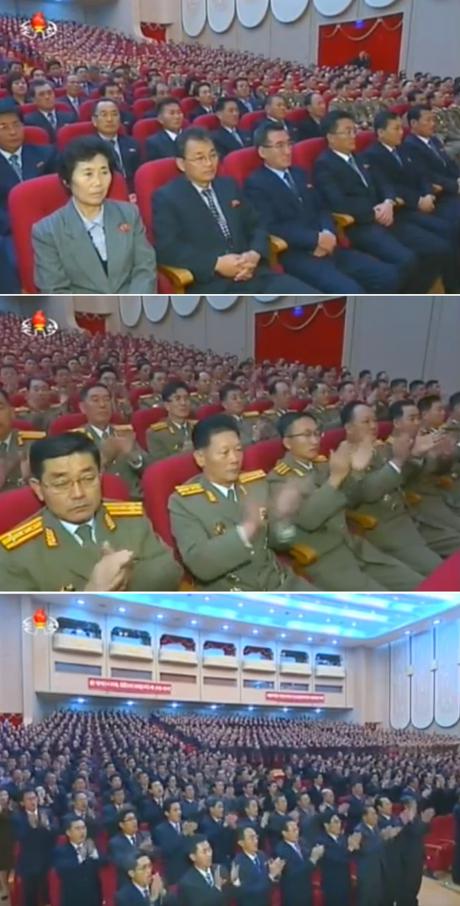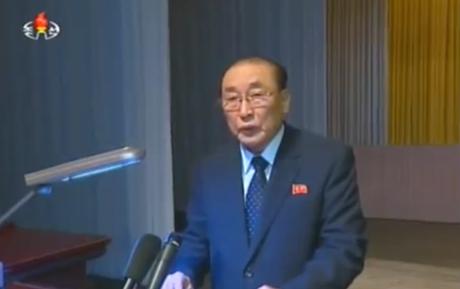![DPRK Prosecutors’ Office and Court Commemorate 70th Anniversary Leadership platform at a meeting commemorating the 70th anniversary of the DPRK's procuratorial and judicial organ at Ponghwa Art Theater in Pyongyang on November 19, 2015. In attendance are DPRK Public Prosecutor's Office Director Jang Pyong Gyu [A], WPK Organization Guidance Department Senior Deputy Director Jon Yon Jun [B], WPK Secretary and SPA Chairman Choe Tae Bok [C] and SPA Presidium Vice President Yang Hyong Sop [D] (Photo: KCTV).](http://m5.paperblog.com/i/135/1359770/dprk-prosecutors-office-and-court-commemorate-L-IgswC3.jpeg)
Leadership platform at a meeting commemorating the 70th anniversary of the DPRK’s procuratorial and judicial organ at Ponghwa Art Theater in Pyongyang on November 19, 2015. In attendance are DPRK Public Prosecutor’s Office Director Jang Pyong Gyu [A], WPK Organization Guidance Department Senior Deputy Director Jon Yon Jun [B], WPK Secretary and SPA Chairman Choe Tae Bok [C] and SPA Presidium Vice President Yang Hyong Sop [D] (Photo: KCTV).
A meeting was held at the Ponghwa Art Theater in Pyongyang on November 19 (Thursday) to commemorate the 70th anniversary of the establishment of the DPRK procurators (prosecutors’ office) and court system. Attending the meeting were Choe T’ae Bok (Workers’ Party of Korea [WPK] Secretary for Science and Education and Supreme People’s Assembly [SPA] Chairman) Yang Hyong Sop (Vice President of the SPA Presidium), Jo Yon Jun (Senior Deputy Director of the WPK Organization Guidance Department), Pak Myong Chol (President of the DPRK Supreme [central] Court), Jang Pyong Gyu (Director of the DPRK Supreme [central] Prosecutors’ Office), other senior party officials, members of the DPRK law enforcement community and senior officials and functionaries of the DPRK’s prosecutor’s office, court system and legal community. Yang Hyong Sop delivered the meeting report.
Views of participants at a meeting marking the 70th anniversary of the establishment of the DPRK’s procuratorial and judicial organs, which was held at Ponghwa Art Theater, on the premises of the Ministry of People’s Security headquarters, in Pyongyang on November 19, 2015 (Photos: KCTV).

SPA Presidium Vice President and WPK Political Bureau Member Yang Hyong Sop delivers the meeting report (Photo: KCTV).
According to KCNA the “procuratorial and judicial organ”:
President Kim Il Sung (Kim Il-so’ng) had a deep insight into the position and role of the judicial and procuratorial organ in the revolution and construction and enunciated the Chuch’ e-oriented idea of law on this basis and established the precious tradition of its work. He declared the establishment of the organ on November 19, Chuch’e 34 (1945).
In the period of building a new country, the President clearly indicated the mission and duty of the judicial and procuratorial organ and provided a strong foundation of the revolutionary and popular judicial and procuratorial work by giving field guidance to its bodies in Pyongyang and local areas together with anti-Japanese war hero Kim Jong Suk (Kim Cho’ng-suk).
Leader Kim Jong Il (Kim Cho’ng-il) developed in depth with his outstanding wisdom and scientific inquiry the revolutionary theory of Chuch’e on the class struggle, people’s democratic dictatorship, state and law in the socialist society put forward by the President and put the judicial and procuratorial work on a higher stage as required by the modeling of the whole society on Kimilsungism.
Over the past seven decades the judicial and procuratorial organ has successfully fulfilled its sacred mission and role as protector of the leader, policies, social system and people under the guidance of the Workers’ Party of Korea.
Meanwhile, on November 17 (Tuesday), the DPRK and Russia signed a cooperation treaty on extraditions and legal assistance. Attending the meeting were Pak Myong Chol, and other DPRK court officials, Russian Minister of Justice Alexandr Konovalov, Russian Ambassador to the DPRK Alexandr Matsegora and Russian Embassy officials based in Pyongyang. Konobalov and Pak signed the treaty.
Filed under: 70th Anniversary of WPK, 7th Party Congress, Central Committee, Choe Tae Bok, dprk attorneys, DPRK Cabinet, DPRK Central Court (Supreme Court), DPRK Legal System, DPRK Supreme Prosecutor's Office (DPRK Central Public Prosecutor's Office), internal security, Jang Pyong Gyu, Jo Yon Jun (OGD), Kim Family, kim jong suk, Kim Jong-il, Korean People's Internal Security Forces, Korean Workers' Party (KWP), kpif, local people's committees, ministry of people's security, Ministry of State Security, National Defense Commission (NDC), North Korean press, Organization and Guidance Department, Pak Myong Chol, Party elders, party life, Political Bureau, population control, Provincial Party Committees, Provinicial People's Committee, Secretariat, social control, State Security Department, Supreme People's Assembly, Yang Hyong Sop
